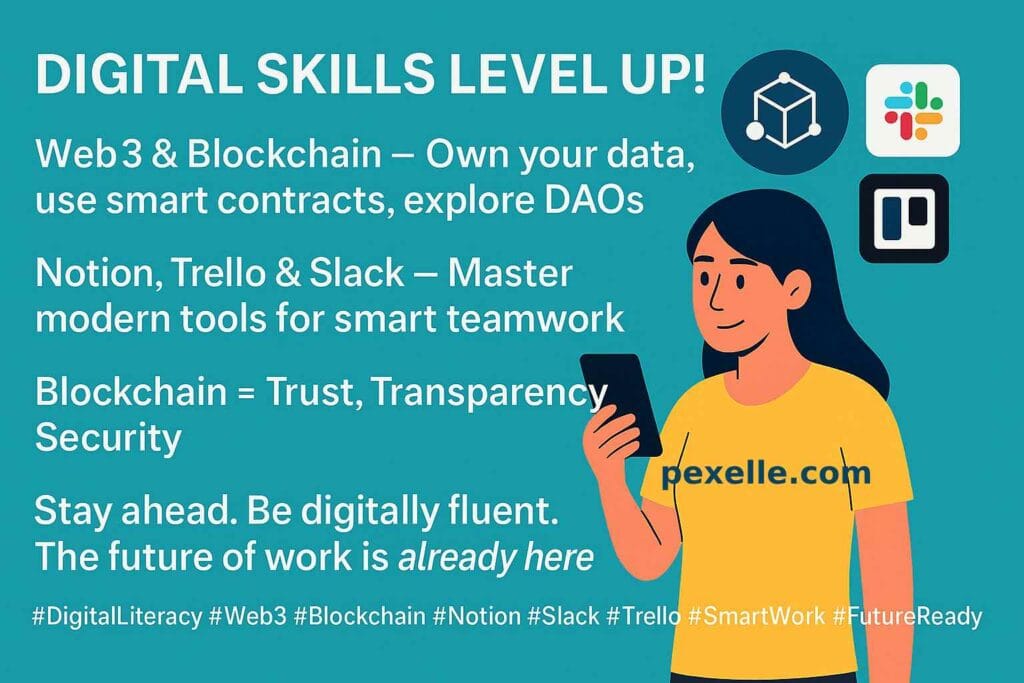Advanced Digital Literacy: Mastering Web3, Blockchain, and Modern Collaboration Tools

In today’s hyperconnected and rapidly evolving digital world, basic computer literacy is no longer sufficient. The new frontier of digital fluency goes far beyond operating a word processor or browsing the internet. It involves a deep understanding of decentralized technologies, blockchain ecosystems, and modern collaborative workspaces. This is where advanced digital literacy comes in—a critical skillset for navigating the digital economy and staying competitive in the workforce of tomorrow.
From Web2 to Web3: Understanding the Shift
While Web2 empowered users to create content and interact socially, Web3 represents a paradigm shift toward decentralization. Powered by blockchain, Web3 enables peer-to-peer transactions, user ownership of data, and trustless digital environments. Understanding this shift is key to advanced digital literacy. Concepts such as digital wallets, decentralized applications (dApps), NFTs, smart contracts, and DAOs (Decentralized Autonomous Organizations) are becoming foundational knowledge for developers, entrepreneurs, and even non-technical professionals.
The ability to navigate a Web3 environment means more than just trading cryptocurrency. It requires a grasp of how distributed ledger technology works, how smart contracts operate autonomously, and how governance is shifting from central platforms to community-driven protocols.
Blockchain: The Backbone of Digital Trust
Blockchain is no longer a buzzword—it’s the infrastructure behind an increasing number of industries, from finance and logistics to healthcare and digital identity. Advanced digital literacy includes understanding how blockchain stores data, ensures immutability, and creates transparency. Users should be familiar with blockchain explorers, layer-1 and layer-2 solutions, and the role of consensus mechanisms like Proof of Work and Proof of Stake.
Moreover, knowledge of blockchain security, encryption methods, and how to use tools like MetaMask or hardware wallets is becoming increasingly important for both personal and professional applications.
Modern Workflows: Mastering Tools like Notion, Trello, and Slack
In the age of remote work and distributed teams, project management and communication tools are the operational backbone of modern businesses. Tools like Notion, Trello, and Slack go beyond mere productivity—they create digital ecosystems that mirror physical offices and workflows.
- Notion acts as an all-in-one workspace where documents, databases, tasks, and wikis converge. Advanced users can build custom dashboards, automate workflows, and integrate APIs.
- Trello, with its Kanban-style boards, enhances visual project tracking and is a powerful tool for agile teams managing iterative tasks.
- Slack transforms team communication into dynamic, searchable, and asynchronous conversations, supporting integrations with nearly every productivity platform.
Mastering these tools means more than just using them—it involves optimizing team processes, enabling automation, and improving cross-functional collaboration.
The Future of Work Requires Future-Ready Skills
Advanced digital literacy is not reserved for IT professionals or blockchain developers. It’s a must-have for designers, marketers, managers, and entrepreneurs who want to stay ahead in an increasingly digital-first economy. Whether it’s understanding how a DAO governs its protocol, managing a cross-border project on Trello, or securely participating in a tokenized economy—these competencies are fast becoming as essential as reading and writing.
Investing time in mastering these technologies and tools is an investment in future-proofing your career and increasing your adaptability in a rapidly changing world.
Source : Medium.com




